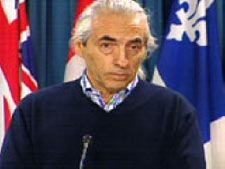By Deborah Gyapong
Canadian Christianity
February 6, 2008
http://www.canadianchristianity.com/nationalupdates/080206bishops
ONE of seven Catholic bishops who met for the first time with the national chief of the Assembly of First Nations (AFN) January 29 said he hopes upcoming Truth and Reconciliation Commission (TRC) hearings will be "balanced."
Keewatin-The Pas Archbishop Sylvain Lavoie said he hopes the hearings will include not only the experiences of victims of abuse at the aboriginal residential schools but also those of the religious sisters and brothers and priests who gave their lives to working in the schools.
"There was a lot of good intentions," Lavoie told a news conference following the meeting. "And sometimes the very people staffing the schools were perhaps in some ways victims themselves of a flawed system, of unreal expectations and certainly perhaps very unjust working hours."
 |
| Assembly of First Nations national chief Phil Fontaine. |
Lavoie added: "I think we'll be able to tell the full story, which I think Canada needs to hear."
AFN National Chief Phil Fontaine said he recognized thousands of Catholic congregation members worked in the schools "in what they sincerely believed to be in the best interest of Indian Residential School students."
However, he cautioned, "it is important for these religious communities to both openly acknowledge their role in Indian Residential Schools and to hear directly from First Nations regarding their experiences. The assistance and participation of the Catholic organizations are integral in the healing and reconciliation process."
"Certainly, mistakes were made and we're open to acknowledging that and being responsible but, most of all, we're hoping the story is . . . balanced," Lavoie said.
The TRC, part of the $2.2 billion Residential Schools Settlement Agreement, will begin hearing testimony some time this year from victims of sexual and physical abuse at the schools that were run by various religious denominations and more than 40 Catholic entities -- dioceses and religious orders.
This is not the first time a bishop has talked publicly about participation in the TRC. Last October, Winnipeg Archbishop James Weisgerber, who was then president of the Canadian Conference of Catholic Bishops (CCCB), told Canadian Catholic News the bishops "want to be very positively involved."
Though he was speaking about the participation of individual bishops, in January, CCCB communications director Sylvain Salvas said the CCCB as a conference would also make a presentation. He was not sure what form it would take, but indicated it could be a letter.
The TRC will begin hearings once a chair and two commissioners are selected from a short list that now sits with Indian Affairs Minister Chuck Strahl and the AFN national chief. The TRC received about 300 suggested names for these roles. Once the appointments are announced, the hearings will begin.
The bishops who took part in the meeting also included Mackenzie-Fort Smith (Northwest Territories) Bishop Murray Chatlain; Whitehorse (Yukon) Bishop Gary Gordon; Grouard-McLennan (Alberta) Bishop Gerard Pettipas; Moosonee-Hearst (Ontario) Bishop Vincent Cadieux; Amos (Quebec) Bishop Eugene Tremblay; and Churchill-Hudson Bay (Manitoba) Bishop Reynald Rouleau.
The settlement agreement includes a government compensation package for every student who attended the schools. The 40 plus Catholic entities -- dioceses and religious orders -- that ran residential schools are responsible for $80 million dollars towards healing and reconciliation. That figure includes cash settlements and in-kind services.
The Catholic entities have not been part of the overall compensation for mere attendance at the schools. Some have argued the schools were a form a "cultural genocide" because they separated the students from their families, their communities and their languages.
Almost two years ago, after the settlement was announced, Weisgerber, speaking on his own behalf and not as archbishop or as then-CCCB vice president, said the prevailing narrative that residential schools were entirely responsible for the plight of Canada's native people needed to be challenged. That narrative also suggests children were routinely sexually and physically abused.
Any original material on these pages is copyright © BishopAccountability.org 2004. Reproduce freely with attribution.